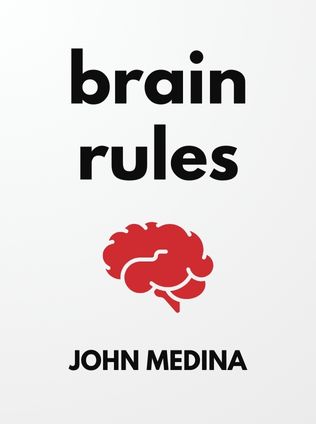
Brain Rules
12 Principles for Surviving and Thriving at Work, Home, and School
By John Medina
Published 04/2014
About the Author
John Medina is a renowned developmental molecular biologist and research consultant. He serves as an affiliate Professor of Bioengineering at the University of Washington School of Medicine. Additionally, he is the director of the Brain Center for Applied Learning Research at Seattle Pacific University. Medina's fascination with brain science has led to several influential publications, including The Genetic Inferno, The Clock of Ages, and Depression: How it Happens, How it Heals. His book Brain Rules delves into the intricacies of brain function and how understanding these principles can enhance our lives, especially in work, home, and educational environments.
Main Idea
Brain Rules by John Medina explores 12 fundamental principles about how our brains operate. Medina draws from his extensive background in molecular biology to present actionable insights on optimizing brain performance in various aspects of life. The main premise is that by understanding and applying these rules, we can improve our productivity, learning, and overall mental well-being. The book challenges common misconceptions about multitasking, the impact of physical exercise on cognitive function, and the differences between male and female brains, among other topics.
Table of Contents
- Exercise Boosts Brain Power
- The Human Brain Evolved, Too
- Every Brain is Wired Differently
- We Don’t Pay Attention to Boring Things
- Repeat to Remember
- Remember to Repeat
- Sleep Well, Think Well
- Stressed Brains Don’t Learn the Same Way
- Stimulate More of the Senses
- Vision Trumps All Other Senses
- Male and Female Brains Are Different
- We Are Powerful and Natural Explorers
Exercise Boosts Brain Power
From an evolutionary standpoint, our brains developed in environments where physical activity was constant. John Medina argues that exercise is crucial for maintaining optimal brain function. He states that "exercisers outperform couch potatoes in long-term memory, reasoning, attention, and problem-solving tasks." This principle suggests that incorporating regular physical activity into our routines can significantly enhance cognitive abilities and productivity.
Key Insights:
- Evolutionary Background: Our ancestors walked up to 12 miles a day, and our brains still crave that level of activity.
- Health Benefits: Regular exercise reduces the risk of diseases such as Alzheimer’s and strokes, thereby preserving brain function.
- Corporate Advantages: Fit employees have better cognitive function, which can be a strategic advantage for companies.
The Human Brain Evolved, Too
The brain evolved to solve problems related to survival in a constantly changing environment. This adaptability is a cornerstone of human intelligence. Medina highlights the significance of symbolic reasoning, which allows humans to attribute meanings to objects and concepts, a skill that distinguishes us from other species. This ability to think symbolically is fundamental to our cognitive development and problem-solving capabilities.
“Symbolic reasoning is a uniquely human talent. It may have arisen from our need to understand one another's intentions and motivations, allowing us to coordinate within a group.” - John Medina
- Using a pentagon to represent the U.S. military headquarters.
- Perceiving a drawing as both a picture and a symbol for a concept.
Every Brain is Wired Differently
One of the central tenets of Brain Rules is that no two brains are alike. This principle has profound implications for education and workplace management. Medina explains that the brain undergoes significant changes throughout life, particularly during childhood and adolescence. Recognizing and accommodating these differences can lead to more effective teaching methods and work environments.
Sign up for FREE and get access to 1,400+ books summaries.
You May Also Like
The Subtle Art of Not Giving a F*ck
A Counterintuitive Approach to Living a Good Life
By Mark MansonRich Dad Poor Dad
What the Rich Teach Their Kids About Money - That the Poor and Middle Class Do Not!
By Robert T. KiyosakiHow To Win Friends and Influence People
The All-Time Classic Manual Of People Skills
By Dale CarnegieFreakonomics
A Rogue Economist Explores the Hidden Side of Everything
By Steven D. Levitt and Stephen J. Dubner



















